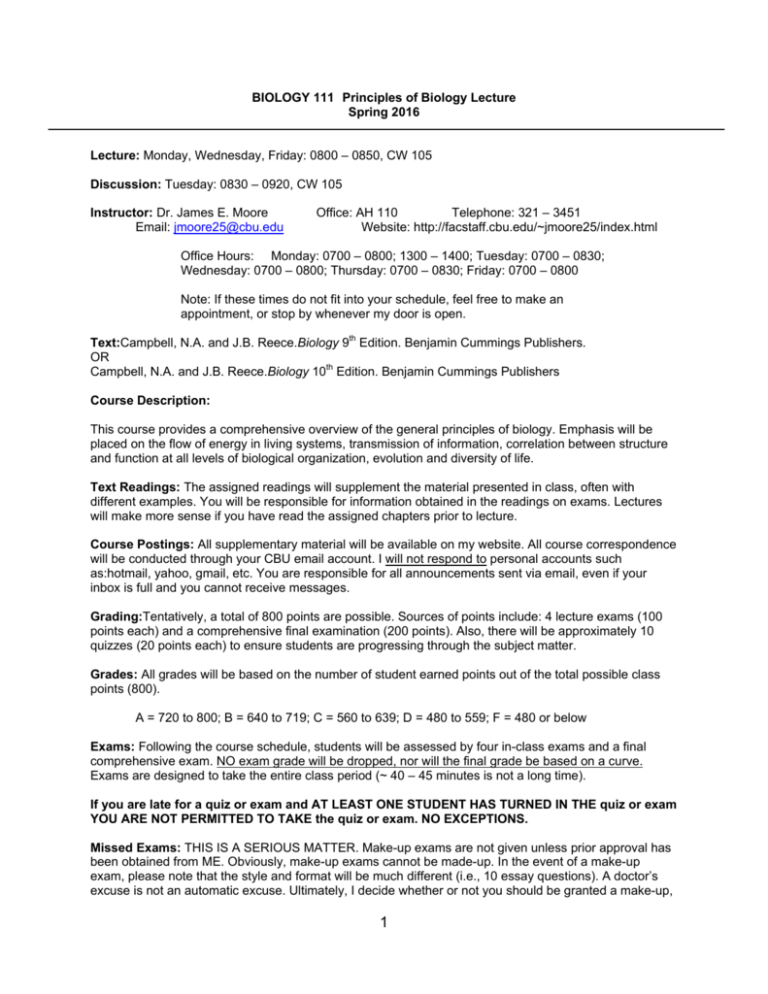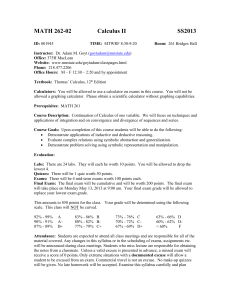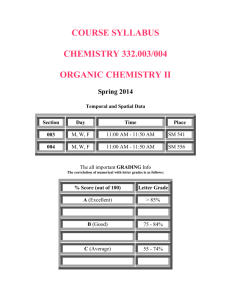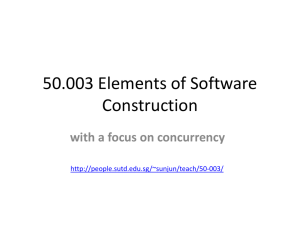BIOLOGY 111 Principles of Biology Lecture Fall 2015 Lecture
advertisement

BIOLOGY 111 Principles of Biology Lecture Spring 2016 Lecture: Monday, Wednesday, Friday: 0800 – 0850, CW 105 Discussion: Tuesday: 0830 – 0920, CW 105 Instructor: Dr. James E. Moore Email: jmoore25@cbu.edu Office: AH 110 Telephone: 321 – 3451 Website: http://facstaff.cbu.edu/~jmoore25/index.html Office Hours: Monday: 0700 – 0800; 1300 – 1400; Tuesday: 0700 – 0830; Wednesday: 0700 – 0800; Thursday: 0700 – 0830; Friday: 0700 – 0800 Note: If these times do not fit into your schedule, feel free to make an appointment, or stop by whenever my door is open. Text:Campbell, N.A. and J.B. Reece.Biology 9th Edition. Benjamin Cummings Publishers. OR Campbell, N.A. and J.B. Reece.Biology 10th Edition. Benjamin Cummings Publishers Course Description: This course provides a comprehensive overview of the general principles of biology. Emphasis will be placed on the flow of energy in living systems, transmission of information, correlation between structure and function at all levels of biological organization, evolution and diversity of life. Text Readings: The assigned readings will supplement the material presented in class, often with different examples. You will be responsible for information obtained in the readings on exams. Lectures will make more sense if you have read the assigned chapters prior to lecture. Course Postings: All supplementary material will be available on my website. All course correspondence will be conducted through your CBU email account. I will not respond to personal accounts such as:hotmail, yahoo, gmail, etc. You are responsible for all announcements sent via email, even if your inbox is full and you cannot receive messages. Grading:Tentatively, a total of 800 points are possible. Sources of points include: 4 lecture exams (100 points each) and a comprehensive final examination (200 points). Also, there will be approximately 10 quizzes (20 points each) to ensure students are progressing through the subject matter. Grades: All grades will be based on the number of student earned points out of the total possible class points (800). A = 720 to 800; B = 640 to 719; C = 560 to 639; D = 480 to 559; F = 480 or below Exams: Following the course schedule, students will be assessed by four in-class exams and a final comprehensive exam. NO exam grade will be dropped, nor will the final grade be based on a curve. Exams are designed to take the entire class period (~ 40 – 45 minutes is not a long time). If you are late for a quiz or exam and AT LEAST ONE STUDENT HAS TURNED IN THE quiz or exam YOU ARE NOT PERMITTED TO TAKE the quiz or exam. NO EXCEPTIONS. Missed Exams: THIS IS A SERIOUS MATTER. Make-up exams are not given unless prior approval has been obtained from ME. Obviously, make-up exams cannot be made-up. In the event of a make-up exam, please note that the style and format will be much different (i.e., 10 essay questions). A doctor’s excuse is not an automatic excuse. Ultimately, I decide whether or not you should be granted a make-up, 1 so be there on time! THERE IS NO MAKE-UP FOR THE FINAL EXAM. IF YOU ARE LATE FOR THE FINAL EXAM AND AT LEAST ONE STUDENT HAS TURNED IN THE FINAL, YOU ARE NOT PERMITTED TO TAKE THE FINAL EXAM. Grade Dispute: I take special care to ensure that all students are graded fairly. If mistakes in grading are found, I will correct the error and point total. If your dispute involves comparing another classmate’s graded exam with your own then I will reassess both students’ entire exams. During this process, grades may change, but not always in a positive direction. All scores and disputes must be conducted within one week of the in-class return date (i.e., you must attempt to reach me by: phone, email, slipping a note under my door) for the exam of consideration. Academic Integrity / Student Conduct: Nothing is more destructive to science and academia than the ‘unethical duplication’ of others’ work. Anyone attempting to pass somebody else’s work as you your own will earn an “F” for the course (NO EXEPTIONS). Cheating, plagiarism or any other form of academic dishonesty will be dealt with according to the CBU Student Handbook. The onus is on you to familiarize yourself with the Student Handbook found at: http://www.cbu.edu/idc/groups/studentlife/documents/web_assets/cbucompass_2010_2011.pdf Turn off all cell phones. If I see you checking facebook status or texting I will (probably not politely) ask you to leave the classroom. If emergency situations arise, please see me before class to discuss them. One of my major pet peeves is lateness. Lateness is disrespectful to me and your classmates, not to mention consistent lateness may result in a drop in your final grade for the course. Attendance and Cancellations: Students are expected to attend all lectures as this will maximize the probability that you will succeed in my course. Any student who has missed > 8 lectures may be withdrawn from the course or given an “F” at my discretion (Since at that point you have missed ¼ of the class). If classes are cancelled on a regular lecture day, exam dates will not change. If classes are cancelled on an exam day, the exam will be given during the next meeting time. I will send updates reminding you if indeed we have a cancellation. Special Needs:Any student who may need class or exam accommodations based on the impact of a disability is encouraged to speak with me privately to discuss your specific needs. Students with disabilities should also contact Student Disability Services (SDS). http://www2.cbu.edu/cbu/StudentLife/DisabilityServices/. Reasonable accommodations will be made available only after I have received written documentation from Student Disability Services. Please deliver the documentation to me in my office as soon as possible. Late notification may result in the requested accommodation being unavailable. 2 Course Schedule: Dates for lecture topics are subject to change. “Ch.” entries refer to readings in the Biology textbook. Major events are boldface. Date M 11 – Jan W 13 – Jan F 15 – Jan M 18 – Jan W 20 – Jan F 22 – Jan M 25 – Jan W 27 – Jan F 29 – Jan M 01 – Feb W 03 – Feb F 05 – Feb M 08 – Feb W 10 – Feb F 12 – Feb M 15 – Feb W 17 – Feb F 19 – Feb M 22 – Feb W 24 – Feb F 26 – Feb M 29 – Feb W 02 – Mar F 04 – Mar 07 – 11 Mar M 14 – Mar W 16 – Mar F 18 – Mar M 21 – Mar W 23 – Mar W 30 – Mar F 01 – Apr M 04 – Apr W 06 – Apr F 08 – Apr M 11 – Apr W 13 – Apr F 15 – Apr M 18 – Apr W 20 – Apr F 22 – Apr M 25 – Apr W 27 – Apr F 29 – Apr M 02 – May 04 – 09 May Topic Ten Themes in the Study of Life Ten Themes in the Study of Life cont. The Chemical Context of Life MLK NO CLASS The Chemical Context of Life cont.(Quiz I) Water & pH Water & pH cont. Carbon Compounds Macromolecules (Quiz II) Macromolecules &Functions The Cell The Cell (Quiz III) EXAM I Membranes Membranes Respiration / Metabolism Respiration / Metabolism (Quiz IV) Photosynthesis Photosynthesis The Cell Cycle (Quiz V) EXAM II Mitosis Meiosis Mendelian Genetics SPRING BREAK Mendelian Genetics (Quiz VI) Chromosomes Chromosomes DNA Structure & Synthesis DNA Synthesis (Quiz VII) Transcription Translation EXAM III Gene Expression Gene Expression Viral Genetics Viral Genetics (Quiz VIII) Darwin & theory of natural selection Darwin (Quiz IX) Population Evolution EXAM IV Origin of Species Bacteria &Archaea (Quiz X) Study Session Final Exam Week 3 Assigned Readings Ch. 1 Ch. 1 Ch. 2 Ch. 2 Ch. 3 Ch. 3 Ch. 4 Ch. 5 Ch. 5 Ch. 6 Ch. 6 Ch. 7 Ch. 7 Ch. 8-9 Ch. 8-9 Ch. 10 Ch. 10 Ch. 12 Ch. 13 Ch. 13 Ch. 14 Ch. 14 Ch. 15 Ch. 15 Ch. 16 Ch. 16 Ch. 17 Ch. 17 Ch. 18 Ch. 18 Ch. 19 Ch. 19 Ch. 22 Ch. 22 Ch. 23 Ch. 24 Ch. 27







